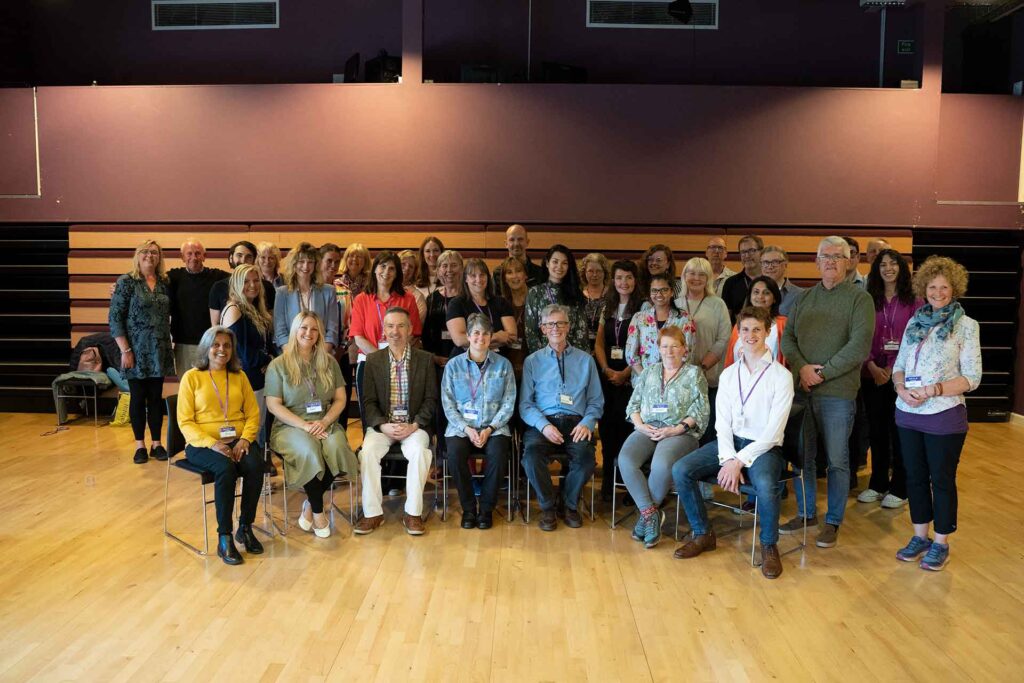
Mindfulness Teacher Training Birmingham
The Mindfulness Now Teacher Training Course in Birmingham provides exceptional teaching in a peaceful environment that promotes deep learning as well as a training experience that increases wellbeing. The beautiful grounds and accessible facilities of the Midlands Arts Centre make this a rounded and immersive training experience with plenty of space for relaxation and consolidation of learning.
Below are some frequently asked questions about training in Birmingham, but if you require further information, please don’t hesitate to contact the UK College on 0121 444 1110 or email us.

Frequently Asked Questions
The fee for all our courses is £900. Your payment of this course fee secures your booking. This payment can be made by clicking on the relevant course date. Alternatively, you can pay via bank transfer – just contact the college on 0121 444 1110 or email us for transfer details.
Once payment has been received you will receive a confirmation email including all course materials and you will then be officially booked on the course.
If you would like to pay over two 50% instalments, please contact the college the UK College on 0121 444 1110 or email us to arrange. Final payment is then due 7 days before your course begins.
We do not offer refunds but are happy to transfer your place on a course as long as we have been given at least 4 weeks in order to re sell your place.
The UK College of Mindfulness Meditation, is very proud to be in its eighth year of providing one of the UK’s most successful, externally accredited vocational training courses – The Mindfulness Now programme, for those who wish to become teachers of mindfulness. This programme integrates key elements of Mindfulness Based Stress Reduction (MBSR) and Mindfulness Based Cognitive Therapy (MBCT).
Nick Cooke developed the Mindfulness Now Programme after his own experience of using mindfulness to help him with his recovery and rehabilitation, including coping with pain following two serious and life-threatening illnesses. He already had considerable experience of learning, practising and teaching mindfulness and, as a talk therapist, it’s something, which for many years, he has taught his clients to practice, often with highly positive results.
The fee is £900 which includes the 5 days intensive training online or in person, assessment and free ongoing help and support. A comprehensive training manual is included as well as additonal online resources video/audio, PowerPoint slides for mindfulness teaching, working with children and for corporate presentations. All resources are also supplied electronically in order that they can be adapted for individual use.
Please see the syllabus and teaching programme below.
It is vital when undertaking training of this nature to ensure that the approval and accreditation meets your needs. Our training has been rigorously assessed and is approved by the British Psychological Society (BPS) to ensure that it meets the continuing professional development requirements for psychologists. However, you don’t need to be a psychologist to undertake this training. With the BPS seal of approval many of our former students teach mindfulness within the NHS, mental health services, all levels of the educational system, within the charity sector, complementary therapies, as well as many other environments. The training is also fully accredited by The National Register of Psychotherapists and Counsellors (NRPC).
To qualify and obtain the certification as an accredited mindfulness teacher, students are required to attend the 5 days intensive course and complete two assignments – one a case study report and the other a brief written question and answer paper. These have to be submitted together, within 6 months of attending the training and, following successful assessment, certification will be provided. Help and support with this is provided upon request.
In order to provide open access to our training we make no assumption of any prior learning. We simply ask that trainees already practice mindfulness meditation personally and are committed to ongoing practice. This inevitably means that some students on our teacher training will have more experience than others. They may, for example, have already attended an eight-week programme but this is not necessary since we cover this in the course.
All our courses are non-residential. The course fee covers the training course and does not include accommodation or food. Refreshments will be provided at the morning and afternoon break.
All our ‘in person’ courses take place at the Midlands Arts Centre, Birmingham, Monday to Friday, 10am till 5pm. Onsite parking is available onsite via a pay and display car park. There is an onsite restaurant/ cafe which provides a varied menu of meals and snacks and there are also supermarkets and other amenities close to the venue.
If you wold like recommendations for places to stay during your training, please contact the college the UK College on 0121 444 1110 or email us.
The hours are 10.00 AM to 5.00 PM apart from on the 5th (final day) when we try and finish at 4.30 PM.
• Participant assessment protocols
• Cautions, safeguards and contra-indications
• Session recording and evaluation
• History / background of mindfulness and mindfulness meditation
• How to conduct mindfulness meditation sessions – seated, lying and movement based
• Attitudinal Basis (Attitudes of mindfulness– Kabat-Zinn)
• Mind Wide Open – peripheral awareness meditation
• 3 stage breathing space
• A wide range of appropriate breath / body / movement and guided imagery meditations
• Breath and body awareness
• Mindfulness in wellbeing
• Mindfulness teaching techniques and methodologies
• Therapeutic interventions with mindfulness
• Developing the teacher’s own mindfulness practice
• Conducting individual / group sessions
• The Mindfulness Now 8 weeks wellbeing programme
• Stress Reduction – the MBSR approaches
• Cognitive behavioural approaches – the MBCT approaches
• Integration of mindfulness with other therapeutic modalities
• Corporate applications of mindfulness
• Teaching mindfulness to children and young people
• Building a mindfulness teaching practice (marketing for teachers)
Due to our policy of continuous improvement, our syllabus, training curriculum and daily structure is constantly evolving and developing.
Day 1 (The basics)
• Introductions, objectives, guidance on attendees safety, wellbeing and responsibility
• Training objectives and summary of training methods
• Exploration of the history, development and practice of mindfulness
• Breaking out of ‘automatic pilot’ presentation, discussion
• Raisin meditation
• Introduction to mindfulness of breath, body and movement (practical movement session)
• ‘Attitudes of mindfulness’ introduction, presentation, discussion and exercise
• Unhelpful automatic routines – discussion
• Helping our participants to bring mindfulness into their lives
• Assignment and qualification requirements
• Sitting meditation sequence, awareness of breath
• Thoughts, feelings / responses exercises
• Cognitive ABC thinking model
• Discussing the training manual contents and other resources
• Introduction to mindfulness teaching programmes, including MBSR, and
MBCT
Day 2 (therapeutic applications)
• Introduction to poems and stories in mindfulness
• The farmer and the horse – metaphor
• Review of mindfulness attitudes – our personal perspectives
• Values and beliefs in mindfulness exercise
• Introduction to participant selection, safety and wellbeing
• Participant interviewing protocol including limits to confidentiality
• Demonstration of interview followed by role play teaching practice sessions
• Mind Wide Open – introduction to ‘Learning State’
• Presentation of a breathing space meditation followed by teaching practice sessions
• Therapeutic use of ‘Body Scan’
• Pleasant Experiences Diary
• Presentation of MBSR development, structure and session-by-session approach (8 weeks programme)
• Presentation of MBCT development, structure and comparison with MBSR
• Introduction to Mindfulness Now teaching programmes – including the 8 weeks formal programme
• Soundwalk (outdoors)
• Old lady and the fish basket metaphor
• Teaching practice sessions – Mindfulness Now programme
• Thoughts and feelings / responses exercises
• Sitting meditation sequence – awareness of breath and body
Day 3 (Therapeutic applications, continued and ‘being a mindfulness teacher’)
• Ethical foundations of mindfulness
• Learning that change takes time
• Skills and perspectives of mindfulness teaching
• The role of ‘enquiry’ in mindfulness teaching
• The natural embodiment of our teaching
• Flexibility within the Mindfulness Now programmes
• One-to-one teaching of mindfulness
• Continuing the Mindfulness Now 8 weeks programme
• Sitting meditation sequence – awareness of breath, body and sounds
• Unpleasant experiences diary
• Mindfulness of breath, body and movement – second practical movement session
• Awareness and interpretation of negative thoughts
• Stopping unwanted thoughts
• Letting in the difficult – practice
• Understanding negative automatic thoughts
• Introduction to published research
• Teaching evaluation method
Day 4 (Working with children – The Gift, contemplative practice)
First half
• The art of teaching mindfulness to children
• Practical resources and how to develop your own
• Safeguards and cautions
• Considering our own suitability
• Adapting our case study process to working with a child / children
• Q & A session on teaching mindfulness – group practice
• Discovering the teachers within us – meditation
• Participant journaling discussion
• The experience of quiet / silent contemplation
• Facilitating enquiry – further exploration
• Teaching practice – sitting meditation sequence
Second half
• ‘The Gift’ – Extended practical experience of quietness, guided meditations, eating and resting, various movement practices including walking and stretching. Formal mindful listening exercise followed by group discussion
Day 5 (Integration, opportunities and professional practice)
• Completing the Mindfulness Now 8 weeks programme
• Teaching practice exercises
• Mindfulness at work – relevance, opportunities and structures
• How to gain corporate work
• Integration of mindfulness and emotional intelligence
• The work of Chade Meng Tan (Search Inside Yourself), and the Google experience
• Practice building /marketing
• Exploring niche opportunities
• Professional standards and ethics
• Setting up supervision and CPD
• Review of ongoing qualification process
• Pain reduction with mindfulness
• Teaching within schools – employment opportunities
• Mindfulness of breath, body and movement – third practical movement session
• Review of learning
Important – please note that the daily structure above is subject to change due to group needs and time schedules.
• To make mindfulness professionally available to a very wide audience, to meet ever increasing needs, through our network of qualified teachers, who are all committed to ongoing professional development and supervision
• To offer accessible and affordable, externally accredited, vocational teacher training
• Monitor all student’s evaluation of training content and delivery and apply a policy of continuous improvement, in order to maintain the highest possible standards
• Maintain on-going and indefinite support for students and graduates including an optional ‘Learning Pathway’ for qualified teachers who wish to extend their training to an advanced level including ‘Trainer Training’
• Uphold high ethical standards of its tutors, students and graduates
The Mindfulness Now accredited teaching qualification can lead to a rewarding career teaching mindfulness, one-to one, or in groups following the structured eight weeks programme taught course or the optional non-formal courses. Former Mindfulness Now students work in many diverse environments including the NHS (including mental health), schools and further education, learning disabilities, hospice movement, charities, as well as in complementary health.
Many mindfulness teachers are self-employed. Some are offered employment in schools though our partnership with NeuroHeadway. Many of our teachers also provide mindfulness programmes within organisations. As part of the training all students receive instruction on practice building and developing corporate work opportunities. Graduates are eligible to obtain professional indemnity and public liability insurance.
Qualified teachers through this programme are offered to opportunity to sign up as licensed and accredited teacher with the UK College on an annually renewable basis. There is no charge for this. Licensees will be able to apply to be members of the Mindfulness Teachers Register. Once again, no charge applies to this.
Licensees are required to observe a code of ethics which includes the necessity for professional insurance, continuing professional development (CPD) and supervision.
The UK College provides an ongoing programme of training events. We would normally expect licensees to attend a minimum of 14 hrs (2 days) of CPD and one retreat per annum.
Group supervision is available to all students via the UK College. Informal help and support is freely available from college tutors and support staff, on an ongoing basis.
There is an entirely optional ‘Learning Pathway’ for qualified Mindfulness Now teachers. This runs from April of each year for twelve months and includes supervised training practise, further developmental training, attendance on a residential retreat in as well as a ‘Train the Trainer’ qualification. This may lead to a licensed opportunity to provide teacher training of the Mindfulness Now within agreed areas.
The Learning Pathway is something which we are only able to offer to a very limited number of participants annually and further information is available upon request and via interview with course tutor, Nick Cooke, who can be contacted on 07811 640897.
Video testimonial




